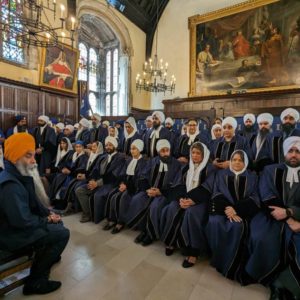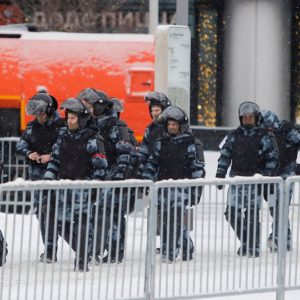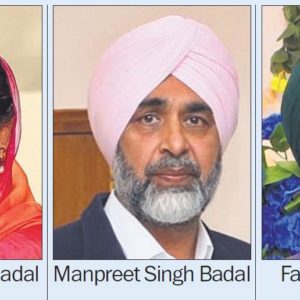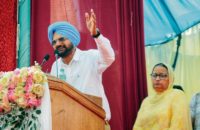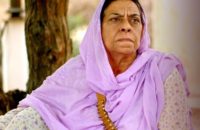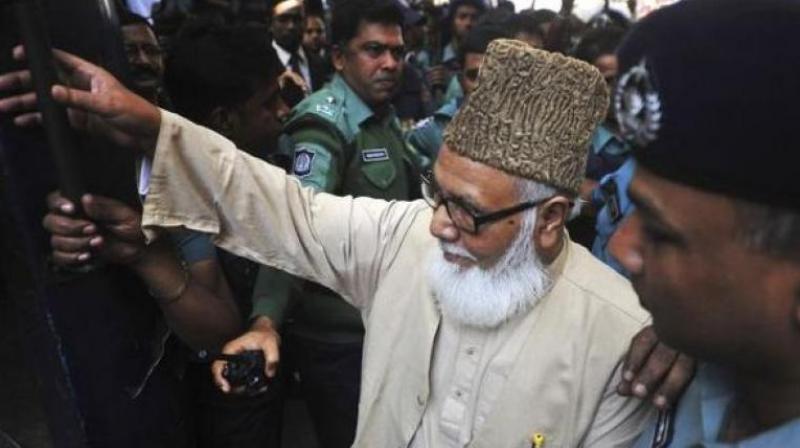 Dhaka: Bangladesh’s Supreme Court on Thursday upheld the death sentence of top Islamist party leader Motiur Rahman Nizami for war crimes, paving the way for his execution within days.
Dhaka: Bangladesh’s Supreme Court on Thursday upheld the death sentence of top Islamist party leader Motiur Rahman Nizami for war crimes, paving the way for his execution within days.
Nizami, head of Bangladesh’s biggest Islamist party Jamaat-e-Islami, was convicted of murder, rape and orchestrating the killing of intellectuals during the country’s 1971 independence struggle.
“We’re satisfied. Now there is no bar to execute him unless he seeks clemency from the president and the president pardons him,” Attorney General Mahbubey Alam told AFP after the Supreme Court dismissed Nizami’s final appeal.
Clemency has never been granted to a convicted war criminal in Bangladesh, and the 73-year-old is likely to be hanged within days.
Security has been stepped up in Dhaka, already tense after a string of killings of secular and liberal activists and religious minorities by suspected Islamist militants.
In 2013 the convictions of Jamaat officials triggered the country’s deadliest violence in decades, with around 500 people killed, mainly in clashes between Islamists and police.
Nizami took over as leader of Jamaat in 2000 and was a minister in the Islamist-allied government of 2001-2006.
Prosecutors said he was responsible for setting up the Al-Badr pro-Pakistani militia, which killed top writers, doctors and journalists in the most gruesome chapter of the 1971 conflict.
Their bodies were found blindfolded with their hands tied and dumped in a marsh on the outskirts of the capital. Prosecutors said Nizami ordered the killings, designed to “intellectually cripple” the fledgling nation.
He was convicted in October 2014 by the International Crimes Tribunal, which was established in 2010 by Prime Minister Sheikh Hasina’s government and has sentenced more than a dozen opposition leaders for war crimes.
Rights groups say the trials fall short of global standards and lack international oversight.
Attorney general Mahbubey Alam told reporters after the judgement, “Now there exists no bar in executing the verdict, once the court issues it in writing, which is expected soon.”
Several hundred activists of Ganojagaran Mancha, which was waging a campaign for the maximum punishment for war criminals, rallied at Shahbagh area in the capital to rejoice the verdict while 1971 members of 1971 victim families appeared in private TV channels to express their satisfaction.
During the over three-hour review hearing on Tuesday, the court heard both Alam and Nizami’s chief counsel Khandaker Mahbub Hossain.
In the apex court, the chief defence counsel appealed to the court to reduce his client’s punishment, saying Nizami was not “directly involved” in mass murders, arsons and rapes despite being the Al-Badr chief.
Alam opposed the argument, saying Jamaat had sided with Pakistani troops in carrying out the atrocities during the Liberation War and as the Al-Badr chief, Nizami could not avoid the responsibility.
Bangladesh’s International Crimes Tribunal (ICT-BD) originally sentenced Nizami to death on October 29, 2014 and after an appeal hearing the apex court found the punishment appropriate for him as it pronounced its judgement on January 6 this year.
The prison authorities served Nizami the death warrant on March 16 as the apex court decision reached them in writing through the ICT-BD following the Jamaat chief sought review of the Supreme Court judgement, exhausting his last legal opportunity to overturn the verdict.
“It would be a failure of justice, unless he is handed down the death penalty,” the ICT-BD commented as it handed down Nizami the capital punishment in October 2014, convicting him of “superior responsibility” as the chief of the infamous Al-Badr militia forces in 1971.
The so-called elite militia force is blamed for running a systematic campaign to massacre a large number of top Bengali intelligentsia just ahead of Bangladesh’s December 16, 1971 victory.
But Nizami was particularly found guilty of systematic killings of more than 450 people alone in his own village home in northwestern Pabna, siding with the Pakistani troops.
Mujaheed, who was also Nizami’s top aide then, was executed on November 22 last year along with Chowdhury of BNP, currently the key-opposition outside parliament. They were hanged immediately after President Hamid rejected their mercy petitions.
Bangladesh has so far executed four war crimes convicts since the belated process to expose to trial the top Bengali perpetrators of 1971 atrocities in line with the 2008 electoral commitment of the incumbent government.
Two others, former Jamaat chief Ghulam Azam and ex-BNP minister Abdul Alim, earlier were handed down “imprisonment until death” penalty instead of capital punishment on grounds of their old age as they exceeded 80. They subsequently died in the prison cells of a specialised state-run hospital due to old age ailments.




 Uber Cup badminton: India’s young women’s squad beats Canada 4-1
Uber Cup badminton: India’s young women’s squad beats Canada 4-1







